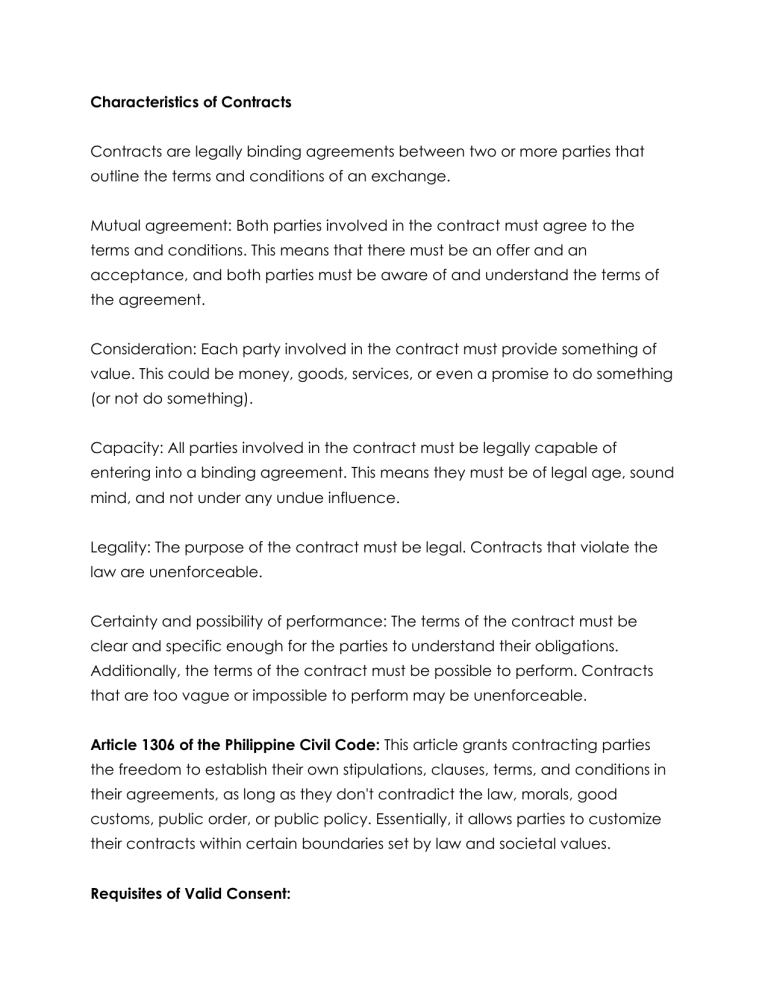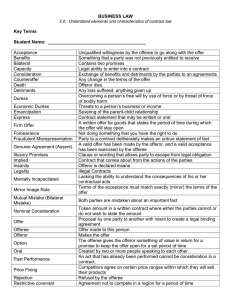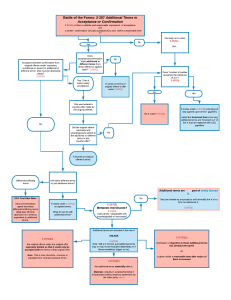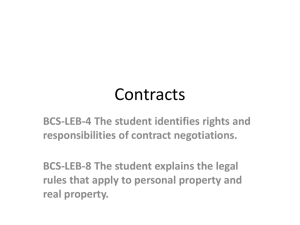
Characteristics of Contracts Contracts are legally binding agreements between two or more parties that outline the terms and conditions of an exchange. Mutual agreement: Both parties involved in the contract must agree to the terms and conditions. This means that there must be an offer and an acceptance, and both parties must be aware of and understand the terms of the agreement. Consideration: Each party involved in the contract must provide something of value. This could be money, goods, services, or even a promise to do something (or not do something). Capacity: All parties involved in the contract must be legally capable of entering into a binding agreement. This means they must be of legal age, sound mind, and not under any undue influence. Legality: The purpose of the contract must be legal. Contracts that violate the law are unenforceable. Certainty and possibility of performance: The terms of the contract must be clear and specific enough for the parties to understand their obligations. Additionally, the terms of the contract must be possible to perform. Contracts that are too vague or impossible to perform may be unenforceable. Article 1306 of the Philippine Civil Code: This article grants contracting parties the freedom to establish their own stipulations, clauses, terms, and conditions in their agreements, as long as they don't contradict the law, morals, good customs, public order, or public policy. Essentially, it allows parties to customize their contracts within certain boundaries set by law and societal values. Requisites of Valid Consent: Freely given: Consent must be given without coercion, undue pressure, or manipulation. The person consenting should feel they have a genuine choice and are not forced into agreeing. Informed: The person consenting must possess all the essential information about the situation they are consenting to. This includes understanding the potential risks, benefits, and alternatives. Specific: Consent should be specific to the particular action or situation at hand. This ensures the person understands exactly what they are agreeing to. Competent: The person consenting must have the legal capacity to understand the information presented and make rational decisions. Legal Capacity to Consent: Legal capacity to consent refers to a person's mental state and age, which allows them to understand and make informed decisions about their rights and obligations. This can vary depending on the specific context and legal jurisdiction. Some general principles include: Minimum age: Most jurisdictions have a minimum age requirement for entering into contracts or consenting to certain actions. This age may vary depending on the specific act or decision. Mental competence: Individuals with certain mental illnesses or cognitive impairments may be deemed incompetent to provide valid consent due to their inability to understand the consequences of their choices. This determination is often made by a qualified professional, such as a doctor or psychiatrist. Requisites of Valid Offer Intention to create legal relations: The offer must demonstrate a genuine intention to enter into a legally binding agreement. This means the offer shouldn't be a joke, social invitation, or mere invitation to treat (like displaying goods in a store, which is an invitation for customers to make offers, not an offer itself). 2. Communication to the offeree: The offer needs to be communicated to the intended recipient, the offeree. This means the offeree must be aware of the offer and its terms. Simply having the intention to offer something without communicating it to the other party doesn't constitute a valid offer. 3. Definiteness and certainty: The offer must be clear and specific in its terms. This includes details like the subject matter, price, quantity, and any other essential elements relevant to the agreement. Ambiguous or vague offers can lead to disputes later and may not be considered valid. 4. Capacity to contract: The offeror, the person making the offer, must have the legal capacity to enter into a binding contract. This means they must be of legal age, of sound mind, and not under any undue influence that could impair their judgment. 5. Seriousness: The offer must be genuine and serious, not made in jest or with the intention of misleading the offeree. Additionally: Offer must not have lapsed: The offer needs to be valid within a specific timeframe. If no timeframe is specified, it should be a reasonable time based on the nature of the offer. An offer that has expired or been revoked by the offeror is no longer valid. Offer must not be illegal: The offer's purpose and subject matter cannot be against the law. Contracts based on illegal activities are unenforceable. Requisites of Acceptance 1. Unconditional agreement: The acceptance must be a complete and unconditional agreement to all the terms and conditions laid out in the offer. This means the offeree cannot introduce new terms or conditions, or attempt to modify the offer in any way. 2. Communication to the offeror: Similar to the offer, the acceptance needs to be communicated to the offeror. Silence or inaction generally doesn't constitute acceptance. The communication method should be consistent with how the offer was made unless otherwise specified. 3. Capacity to contract: Just like the offeror, the offeree (the person accepting the offer) must also have the legal capacity to enter into a binding contract. This means they must be of legal age, of sound mind, and not under any undue influence. 4. Mirror image rule: In most jurisdictions, the acceptance must be a "mirror image" of the offer. This means it must precisely match the terms and conditions presented in the original offer. Any deviation from the offer's terms can be considered a counter-offer, which essentially rejects the original offer and potentially opens negotiations for a new agreement. 5. Timely acceptance: The acceptance needs to be received by the offeror within a reasonable timeframe. This timeframe can be explicitly stated in the offer, implied based on the nature of the offer, or determined based on prevailing business practices.




